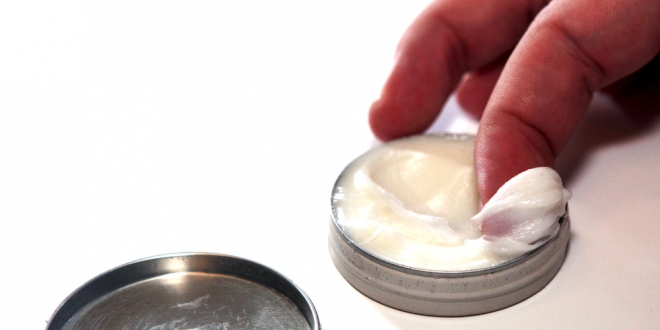A study at the Faculty of Science shows how molecules in different liquids and creams affect the skin, but also how the solvent is affected by being absorbed into the skin.
Written by Tindra Englund. Translated by Rebecka McKinnon Forsell
It is only a small amount of the skin’s molecules that are in liquid form. However, these molecules are in motion and they are important because they decide many of the skin’s properties like elasticity and barrier function.
– We have studied the skin for many years. It is partly a biological system but also a fantastic material and membrane, says Professor Emma Sparr.
The Products Affect the Skin in More Ways than We Know
In this recent study, scientists at Lund’s Faculty of Science have noticed how molecules in liquids and creams affect the skin, but also how they are affected by being absorbed into the skin.
– Today, we use a lot of different products that are in contact with the skin, both voluntarily and involuntarily, says Professor Emma Sparr.
More or Less Liquid
A lot of the products are affecting the skin’s penetrability, making the skin more or less liquid. This effect is intentional in some products in order to make the skin absorb medication or vitamins.
– When making the skin more penetrable to a certain substance, it also becomes more penetrable to other things although it affects the skin only during shorter periods, says Professor Emma Sparr.

– Normal skin is a complex structure and only a small amount of its molecules are liquid. The amount of liquid molecules is not constant and factors like the environment and added products on the skin can change the amount of liquid molecules, says Professor Emma Sparr.
The New Method
So far, there has been a lack in tools to research these liquid molecules and how they are affected by added products, even though the molecules are very important for the quality of the skin. Emma Sparr and her research team have succeeded in finding a method to distinguish how different products affect the skin’s molecules.
By using NMR, (Nuclear Magnetic Resonance), scientists have discovered changes in these molecules when they interchange with molecules from different solvents. The scientists have also been able to distinguish effects the other way around, how the added molecules are affected by the skin’s molecules.
– On the one hand we can now explain earlier observations, and on the other, we now have better possibilities to predict what will happen when adding a certain type of substance, says Professor Emma Sparr.
Make Smart Choices Possible
There is a big interest in the new research and the research team is already collaborating with both dermatologists and companies that develop cosmetics and pharmaceuticals that are applied to the skin.
– If you don’t have a fundamental understanding of the mechanisms, you will have trial and error but with help and experience, this method can help you make smart choices, says Professor Emma Sparr.
No Need to Worry
So far, Professor Emma Sparr is not too concerned with the results on how the way products affect our skin. On the contrary, she is becoming all the more curious.
– Every discovery we do leads to more new questions to answer and the results can help in other areas where products are applied to the skin, says Professor Emma Sparr.
It can be about hygiene, cosmetics and pharmaceuticals. A medical ointment has to transport active molecules through the skin; a skin lotion can make the skin softer and more supple while a disinfectant shouldn’t have any effects on the skin’s quality.
– The more knowledge about molecular mechanisms we gain, the more effectively we can influence and regulate the qualities of the skin, says Professor Emma Sparr.
The study has been made by Professor Emma Sparr together with Professor Daniel Topgaard and doctoral candidate Quoc Dat Pham.






